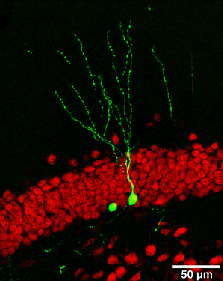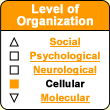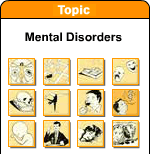|
|



Neurogenesis
and Depression
Depression does not appear to be due solely to an imbalance between certain chemical messengers
in the brain. Recurrent depressions may be more like a degenerative disease in which some nerve cells and neural connections are damaged or destroyed. Ultimately, it is the individual's abilities to adapt to new situations that become impaired. |
Taken in large doses, antidepressants may also affect the structure of neurons in other ways that we would tend to equate with brain damage.
Thus these substances not only re-establish the equilibrium of certain neurotransmitters but also probably produce changes in the structure
of numerous neural networks. |
|
|
| ANTIDEPRESSANTS AND THE GROWTH OF NEW NEURONS |
|
Most antidepressant medications act by increasing the levels of
certain chemical messengers, such as serotonin,
that pass between the neurons. The most famous of these drugs, Prozac,
has acquired the reputation of a miracle pill that can not only
treat depression but also lift people's spirits when they are simply
feeling a little blue. Unlike many other medications, such as Valium,
that calm people down by simply making them stop caring about their
problems, antidepressants such as Prozac appear to cause an actual
positive personality change in many people who take them.
Surprisingly, the experts still don't know why elevating serotonin
levels with antidepressants makes people calmer and more likely
to make long-term efforts to improve their mental health, such
as entering psychotherapy.
Nor do the experts know why antidepressants generally take three
to six weeks to start improving a patient's mood, or why these
drugs can improve the mental condition of people who are not clinically
depressed, but simply shy or compulsive.
In the late 1990s, however, some scientists offered an hypothesis
that might help to solve a fair share of these mysteries: that
the mechanism by which antidepressants that increase serotonin
levels improve depressive states is by encouraging
the growth of new neurons in a particular region of the brain.

New neuron that has grown in the hippocampus
of an adult mouse
Source: Henriette van Praag,
Salk Institute for Biological Studies, USA
What makes this hypothesis so interesting is that the region in question is the
hippocampus, which is already known to lose large amounts of neurons in people
who experience prolonged
stress or prolonged states of depression.
|
|





